30 Easy Ways to Make Your Home More Eco-Friendly
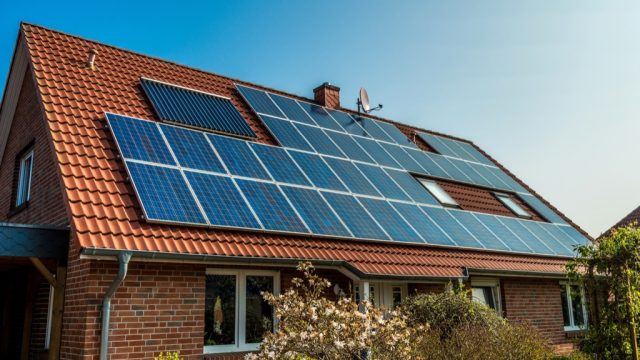
Forking out half your year’s salary for a Prius isn’t the only way to make your life more eco-friendly. While many people associate going green with inconvenient and expensive lifestyle changes, there are actually several cheap and easy adjustments you can make around the house to significantly shrink your carbon footprint.
To make it as easy as possible for you to transform your house into a clean energy haven, we’ve rounded up a list of the easiest eco-friendly changes right here. So read on, and soak in the satisfaction that comes with being a do-gooder! And for more ways to start living a more responsible lifestyle, check out the 40 Ways to Make Your 40s Your Healthiest Decade.
1
Use a Pressure Cooker

You’ll be doing both the environment and yourself a favor by investing in a pressure cooker. The kitchen gadget, which speeds up the time it takes to cook a stovetop meal, allegedly reduces cooking time by as much as 70 percent, which means less energy used preparing your favorite pot roasts, pastas, and potatoes.
2
And Opt For the Toaster Oven

If you’re cooking a small meal for one, opt for your toaster over instead of your larger electric oven. The U.S. Department of Energy found that toaster ovens used up to half as much energy compared to a conventional electric oven, primarily because a conventional oven requires preheating or is more frequently opened and closed throughout the cooking process, which lets the heat out.
3
Light Up the House with LEDs

According to the U.S. Department of Energy, light-emitting diodes (LEDs) use 75 percent less energy and last 25 times longer than incandescent lighting. And not only do they have the potential to save the environment, they’ll also save you a huge chunk of money on your energy bill. And for more ways to keep some extra cash in your wallet, discover these 52 Ways to Be Smarter with Money in 2018.
4
Compost Your Scraps
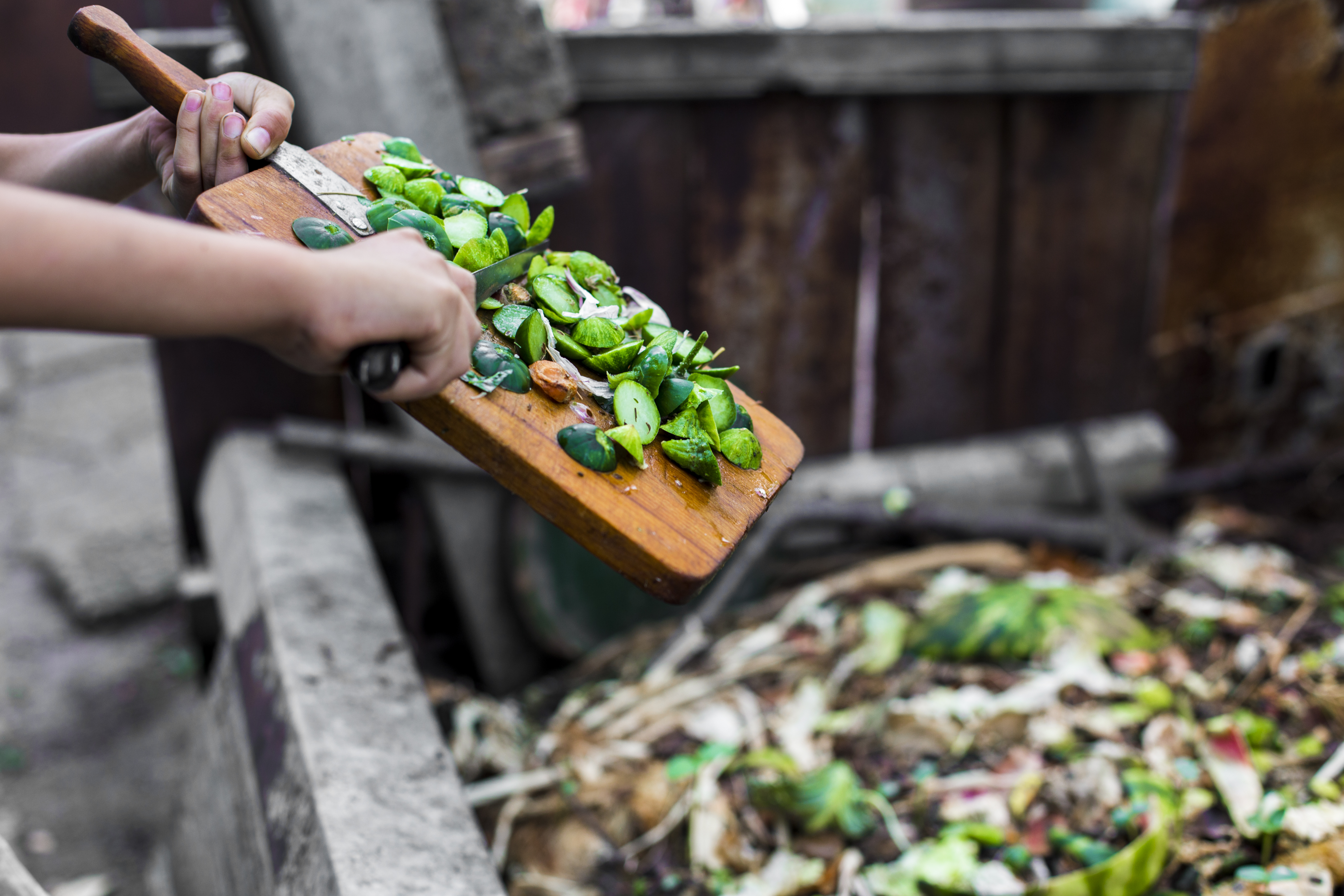
Even the most efficient eaters are going to end up with scraps of food to throw away at the end of a meal. But instead of throwing them into the trash, the more eco-friendly thing to do is to store them in a bin for composting. As one study from the University of Washington found, food waste in landfills is one of the leading causes of methane, but composting prevents the food’s decomposition and subsequent release of greenhouse gases.
“Putting your food waste in the compost bin can really help reduce methane emissions from landfills, so it’s an easy thing to do that can have a big impact,” lead study author Sally Brown said in a press release. And the U.S. Composting Council has created a convenient map of the composting locations across the United States so you can find a location near you!
5
Put Away the Plastic Bottles

Putting your plastic water bottle in the recycling bin doesn’t make up for the fact that you’re using a plastic bottle in the first place, unfortunately. According to The Water Project, an estimated 80 percent of all plastic water bottles in the United States get tossed in with the trash, and only 20 percent of the bottles that are recycled can actually be used for recycling. And as for the bottles that are thrown away, they take over 1,000 years to biodegrade. Buy a reusable bottle instead and you’ll be saving the environment with every sip.
6
Adopt Meatless Mondays

Skipping out on the sausage for just one day a week can have a surprisingly huge impact on the environment. According to the Earth Day Network, eating one less burger a week for a year has the same environmental impact as taking your car off the road for 320 miles. And if you really wanted to commit to the cause and become a full-blown vegetarian, you could potentially reduce global greenhouse gas emissions by 63 percent. If you’re interested in making the switch, you could always Steal This Firefighter’s Vegetarian Diet for Staying Ripped.
7
Fix a Leaky Faucet
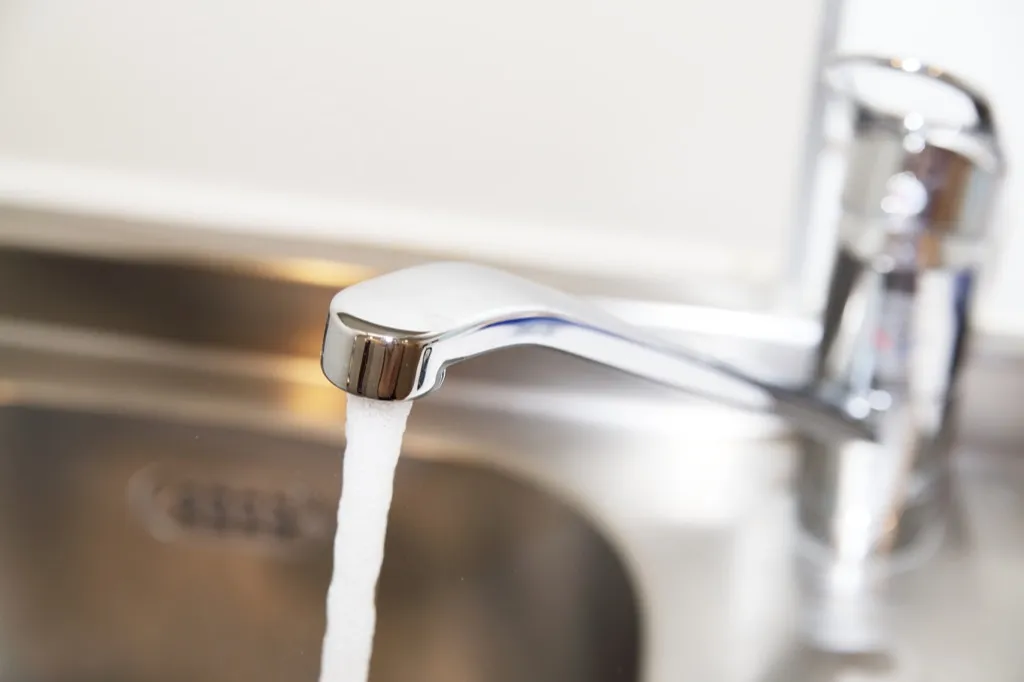
The slow, excruciating drip of a leaky faucet is enough to drive anyone insane. Add to that the fact that one drip every second adds up to five gallons of wasted water per day, and you have no excuse not to call a plumber ASAP.
8
Shorten Your Showers

Don’t dawdle in the shower just because the warm water feels nice on your skin. Shortening your shower by as little as one minute can save up to 150 gallons of water per month. And if you keep your shower until five minutes total, you can save up to 1,000 gallons monthly.
9
Unplug Unused Electronics
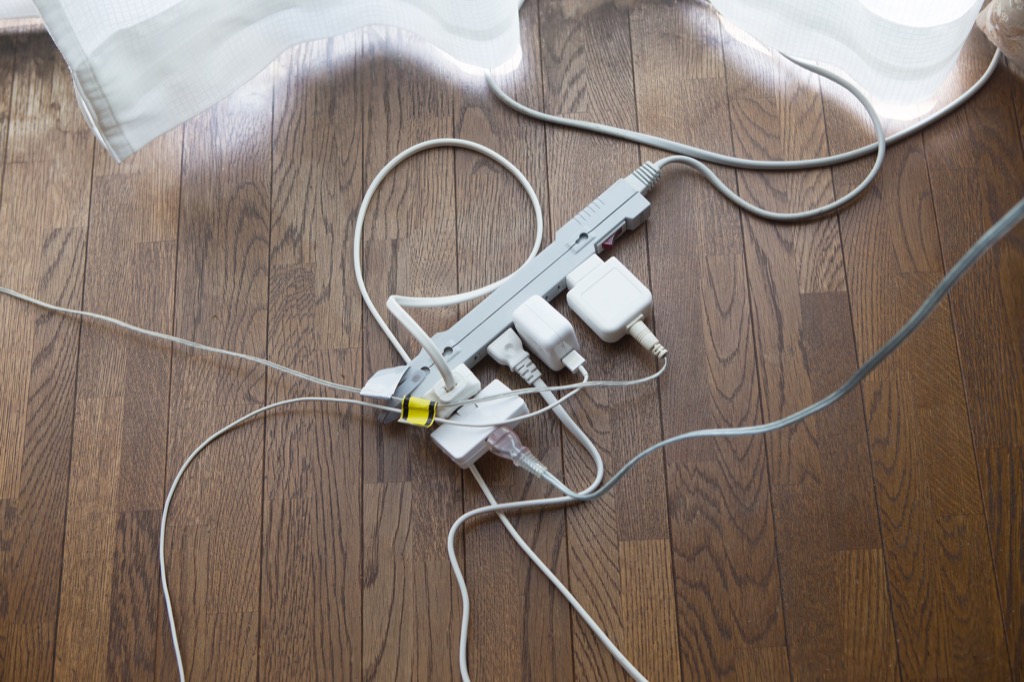
Want to save the planet in seconds? Just unplug. “The simplest and most obvious way to eliminate power losses is to unplug products when not in use,” write the authors of Consumer Guide to Home Energy Savings – 9th Edition. If you don’t feel like pulling every lamp and charger out of the outlet when you leave the house, use a power strip instead—it’ll leave you with just a single thing to unplug.
10
Line Dry Your Laundry
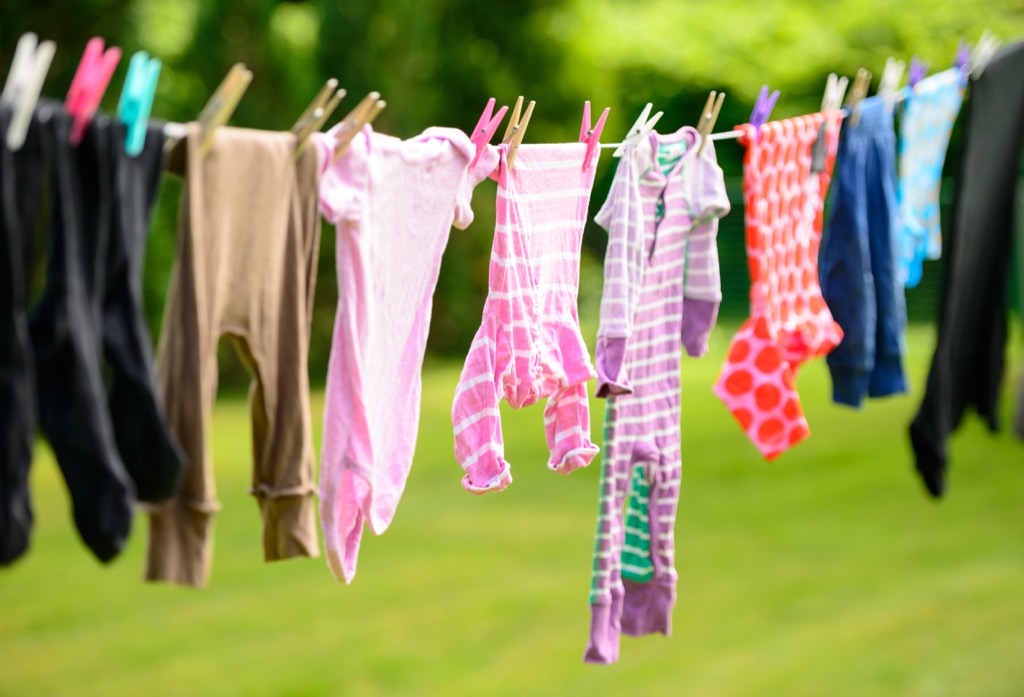
Want to save energy and money? Nix the dryer altogether and instead, try line drying your laundry. The EPA determined that a dryer uses more energy than a refrigerator, washer, and dishwasher, and line drying can reduce energy usage from major appliances in a typical household by as much as one-third. For more money-saving and eco-friendly laundry hacks, try these 20 Ways to Do Laundry in Your Freezer.
11
Don’t Pre-Rinse Your Dishes
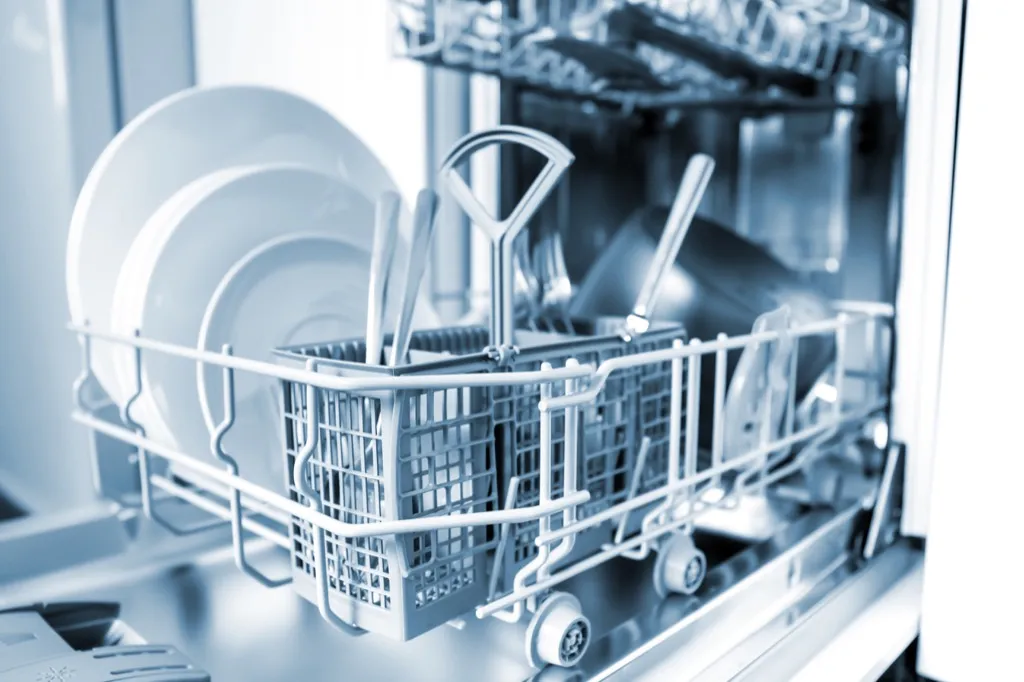
In perhaps the greatest news of all time, energy-saving experts are advising not to pre-wash your dishes before throwing them in the dishwasher. In fact, doing so is a waste of both water and time. Instead, ditch the double wash and scrape any leftover food into the compost, then pop your dishes straight into the machine.
12
Buy Pre-Loved Products

Take a page out of Macklemore’s book and head to the thrift store for your next shopping spree. As Richard Robbins highlighted in his book Global Problem and the Culture of Capitalism, consumerism and the production process have a detrimental environmental impact.
“The production, processing, and consumption of commodities requires the extraction and use of natural resources (wood, ore, fossil fuels, and water),” Robbins wrote. Every time you buy new clothing, you’re contributing to the release of environmental toxins and, if you’re into fast fashion, a ton of easily-avoidable waste. By buying pre-loved goods, we can stop contributing to this negative cycle. But if you do want to splurge on something new (and one piece won’t hurt), try these 15 Killer Style Accessories You Never Knew You Needed.
13
Limit Your Electronics Usage

It’s hard to avoid the temptation of technology, especially when you get home from a long day of work and want to unwind with an episode of Unbreakable Kimmy Schmidt. But if you want to slash your carbon footprint, you should aim to keep the device usage to a minimum.
How exactly are your electronics and the environment related, you ask? Well, according to a study from McMaster University, the data centers that drive our electronics consume quite a bit of energy, and a majority of them are powered by fossil fuels. “For every text message, for every phone call, every video you upload or download, there’s a data center making this happen… [and they] consume a lot of energy to serve you,” said study author Lotfi Belkhir. Instead of wasting energy (pun intended) on electronics, try entertaining yourself with these 20 Genius Ways to Kill Time without a Smartphone.
14
Turn Off the Lights

Turning off the lights is a simple act that goes a long way. According to research from Imperial College London, the British government’s estimate of how much carbon dioxide can be saved by switching off the lights is 60 percent too low, and the seemingly insignificant action has greater consequences than experts once assumed.
“Any reduction we make in our electricity use—for example, if everyone switched off lights that they weren’t using, or turned off electric heating earlier in the year—could have a bigger impact on the amount of carbon dioxide emitted by power stations than previously thought,” study author Dr. Adam Hawkes said. And if you’re too lazy to physically turn off the light switch, you can always invest in smart lights that respond to audio commands.
15
Tinker with Your Toilet
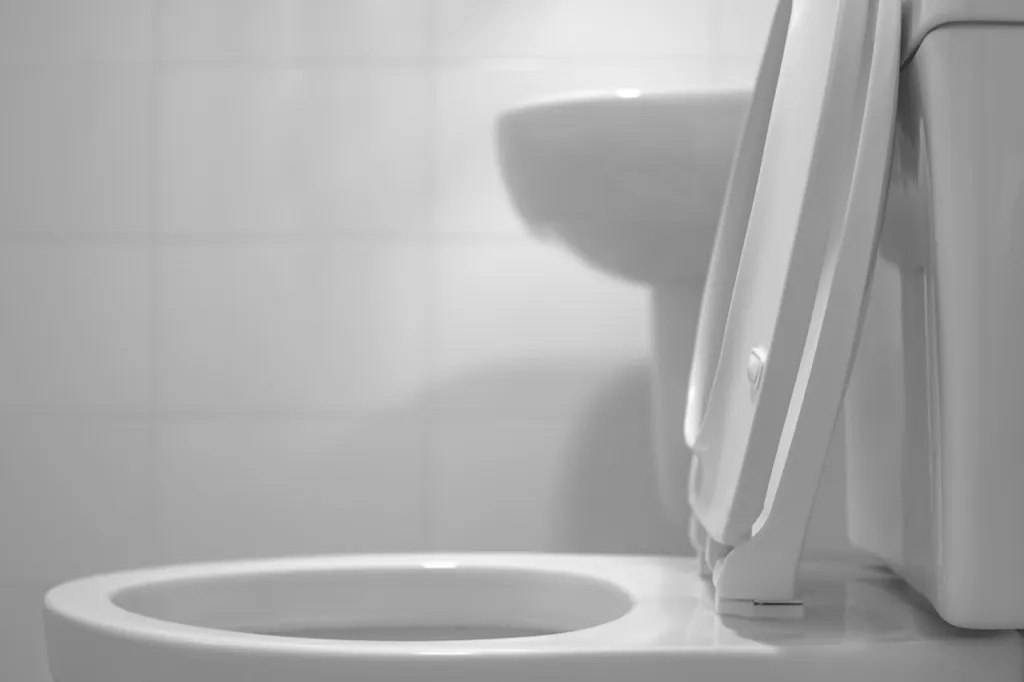
According to the EPA, toilets account for almost 30 percent of the average household’s indoor water usage. One easy way to slash this number is by upgrading an older toilet model to an EPA-certified WaterSense model. Nationwide estimates that the eco-friendly models can save as much as 13,000 gallons of water per year, plus slash water bills by $90.
16
Pass on Paper Towels
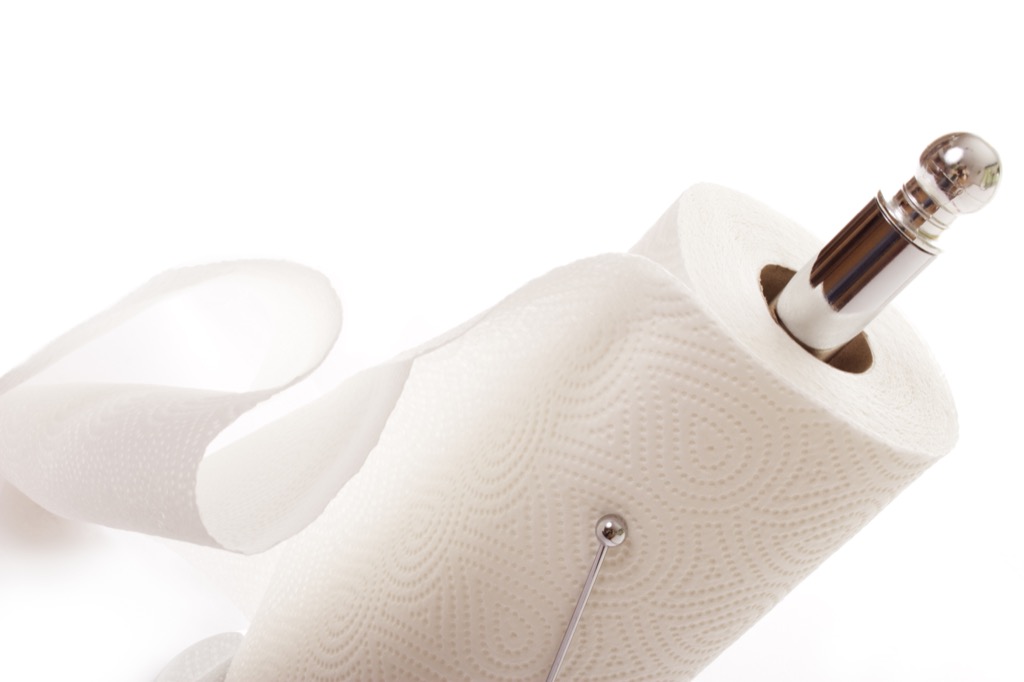
You don’t have to give up paper towels completely, but it’s best to use them sparingly. Scientists at Massachusetts Institute of Technology (MIT) compared the seven most common methods for drying hands and found that using paper towels generates 70 percent more carbon emissions than cold air-driven hand dryers. Of course, you probably don’t have a hand dryer at home, but even using a cotton towel is 48 percent more eco-friendly than drying off with a paper towel.
17
Wash Your Clothes in Cold Water
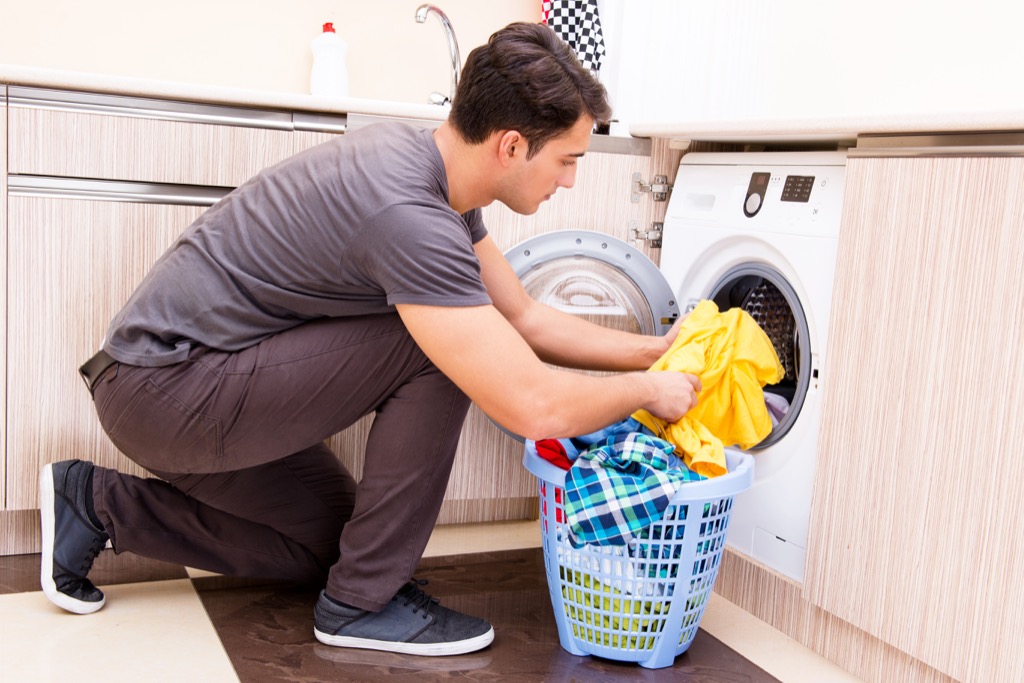
Believe it or not, almost 90 percent of the energy a washing machine uses goes toward heating water, according to Energy Star. By using the cold water setting on your washing machine, you can eliminate up to 1,600 pounds of carbon dioxide emissions per year.
18
Decorate with House Plants
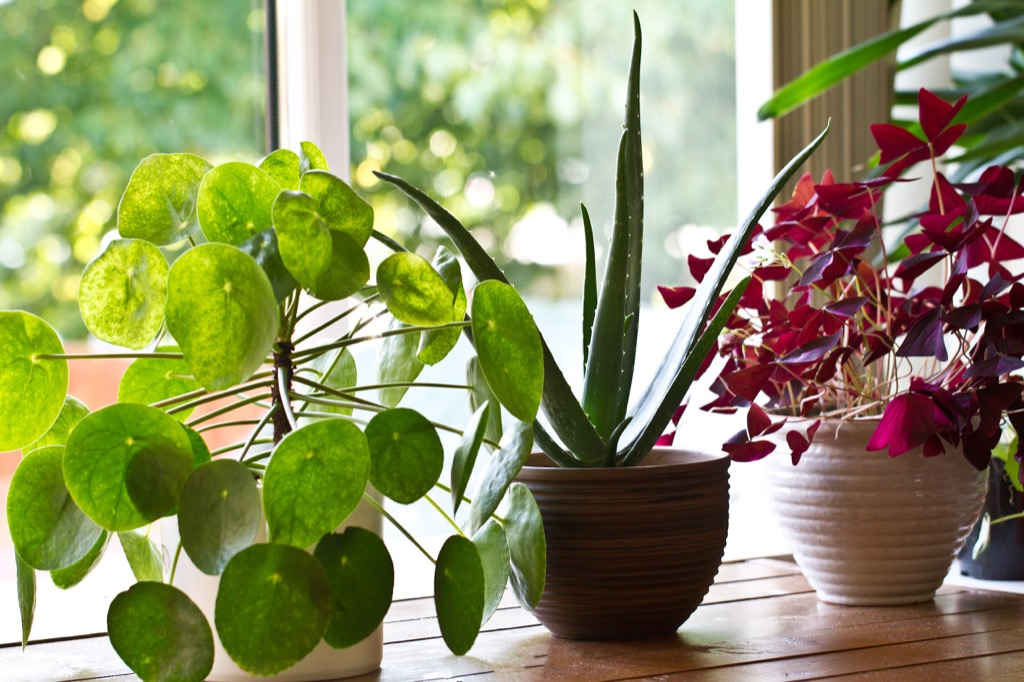
Caring for house plants takes quite a bit of responsibility. However, the ends justify the means: Scientists from the University of Technology in Australia found that the soil in potted plants can clean indoor air of toxic substances like benzene. Scientist Bill Wolverton, who authored a famous NASA study on air purification, recommended the Boston fern and the golden pothos for effective air cleansing.
19
Reuse Shopping Bags
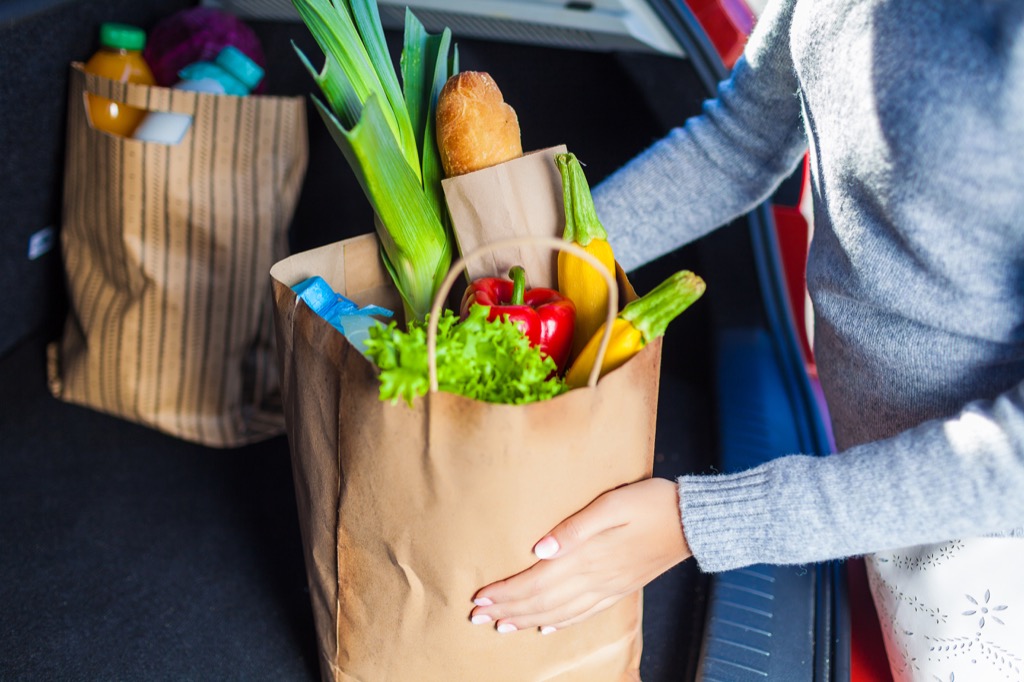
Whether you opt for paper or plastic is irrelevant, so long as you reuse the bags you get from the grocery store. An extensive report from the Environment Agency determined that paper bags must be reused at least thrice to compensate for their environmental effects compared to those of plastic bags. And reusable cotton bags have to be reused at least 131 times to break even with a plastic bag due to the environmental impact of their production.
Of course, paper is compostable whereas plastic holds a high carbon footprint, so in the end, any bag you use is fine—so long as you keep using the same one.
20
Keep Your Cat Inside

America’s second-favorite household pet holds the fate of the environment in its claws. According to one study published in Nature Communications, cats that are allowed outdoors (strays included) are responsible for the deaths of as many as 3.7 billion birds and 20.7 billion mammals in the United States per year, potentially causing dramatic ecosystem shifts along the way. If you do happen to own a cat, make sure it stays inside for every other animal’s sake.
21
Use Natural Beauty Products

As summer gets closer and we begin to worry more about the harmful effects of UV light, it’s important to check our beauty products for nano-titanium dioxide. According to researchers from the University of Toledo, these sunlight-blocking particles get into the water supply when we wash our beauty products off and can harm the natural environment. That doesn’t mean you shouldn’t wear sunscreen, though: Find a good natural sunscreen or risk these 20 Ways Sunburn Harms Your Overall Health.
22
Shop Locally

The fewer hands your food passes through, the better. The Carbon Offsets to Alleviate Poverty Organization (COTAP) reports that an estimated 13 percent of greenhouse gas emissions in the United States stem from the production and transportation of food. Opt for organic and locally-sourced products, especially those from farmers’ markets.
23
And Grow Produce in a Garden

If you want to take your eco-friendly eating habits one step further, you can use your backyard space to start growing your own produce. “By growing your own food, you eliminate the emissions that come from the transportation of goods to your local markets and mass grocery stores,” Arcadia Power advises.
24
Cook More Meals at Home
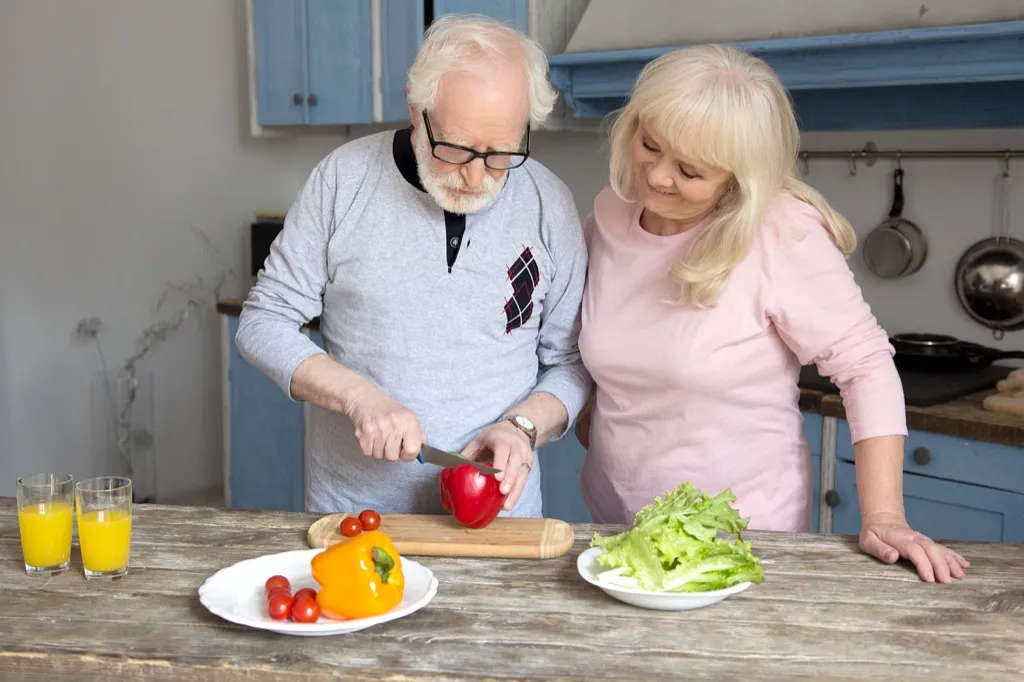
We can’t control the portions we receive at restaurants, but we can control how much food we make at home. And those portion sizes could help cut back on the amount of food America wastes, which is a lot: A recent report found that almost 50 percent of all of the country’s produce—about 60 million tons—is thrown in the trash.
25
Turn Off Your Ice Maker

Most people don’t consume dozens of ice cubes a day, and yet they leave their ice makers running all day. This small slip-up has a big impact on energy consumption: According to TIME, the average ice machine increases energy use by up to 20 percent when it’s running 24/7. Turn off your ice machine when you aren’t using it, or better yet, buy an ice tray and create cubes sans carbon emission.
26
Stop Buying Plastic Plates
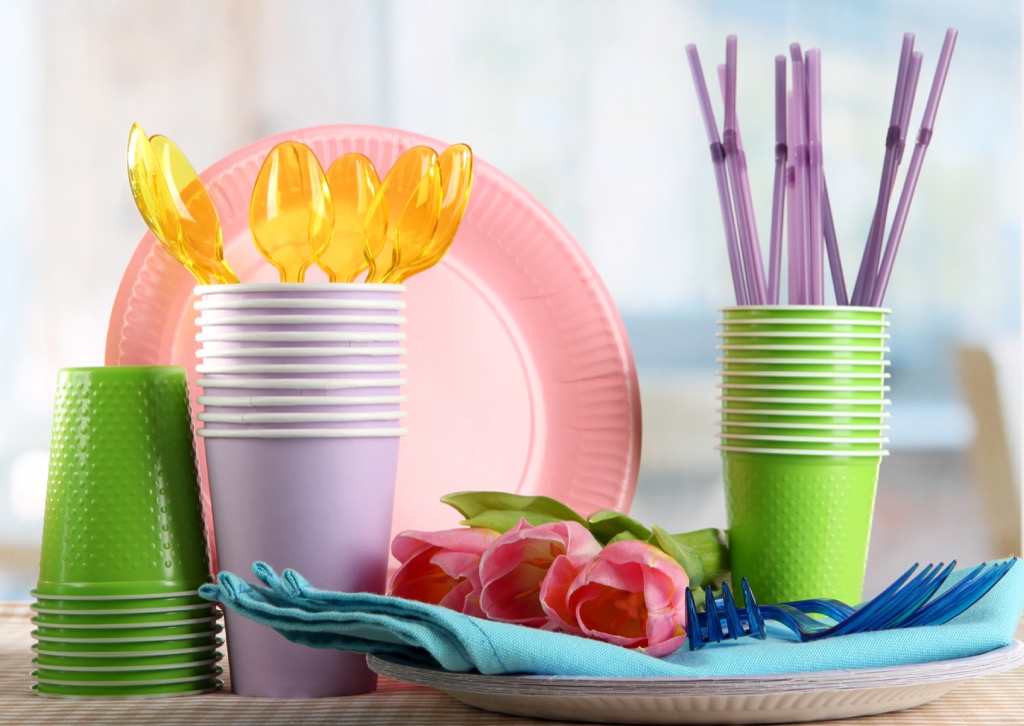
When you don’t feel like doing the dishes, plastic plates and silverware feel like an easy out, but these single-use products are costly for both your bank account and the environment. “Making the switch from disposable plastic to sustainable alternatives is an investment in the long-term future of our environment,” said Erik Solheim, head of UN Environment, who conducted research on replacing plastic products with more eco-friendly products. “Packaging and other single-use items form a large proportion of the plastic litter leaking to the ocean.”
27
Mitigate Microwave Use

Microwavable meals are cheap, easy, and sometimes even scrumptious. But a study from the University of Manchester is making us question our reliance on the kitchen appliance: Apparently, microwave usage in the European Union emits as much carbon dioxide per year as 6.8 million cars. Instead of throwing out your microwave, the study authors suggest adjusting cooking times according to the type of food being prepared and using your microwave until it is truly on its last legs.
28
Dry Your Dishes By Hand
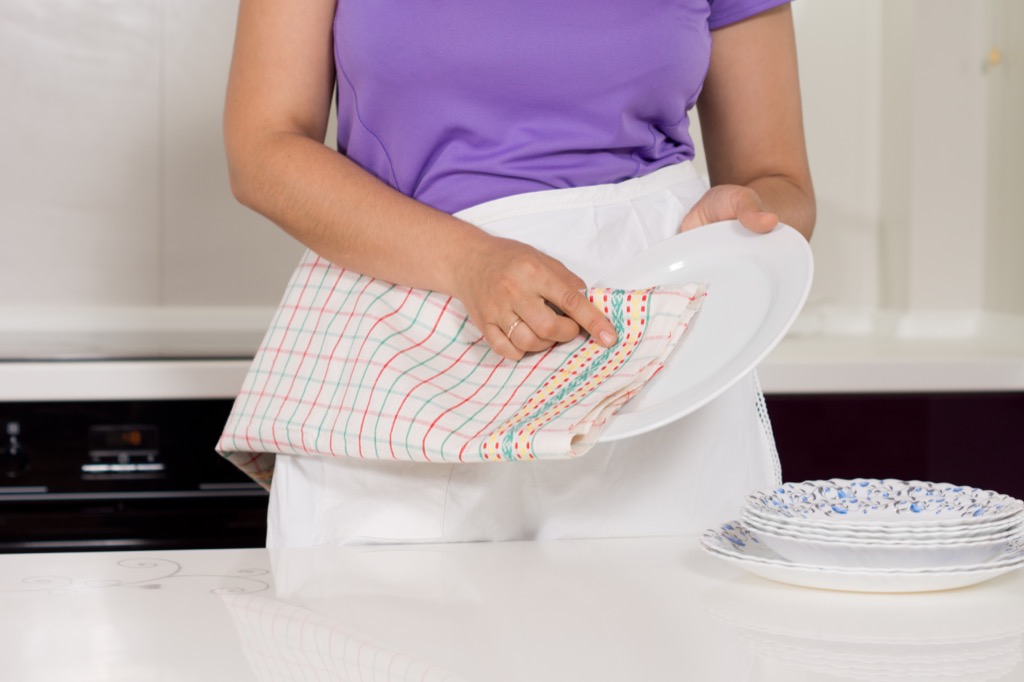
Though using the dishwasher to wash your dishes can save water, drying them in the machine will only contribute to your energy bills. According to the energy company Constellation, drying your dishes by hand can cut your dishwasher’s energy use by up to 50 percent.
29
Insulate Heating Ducts
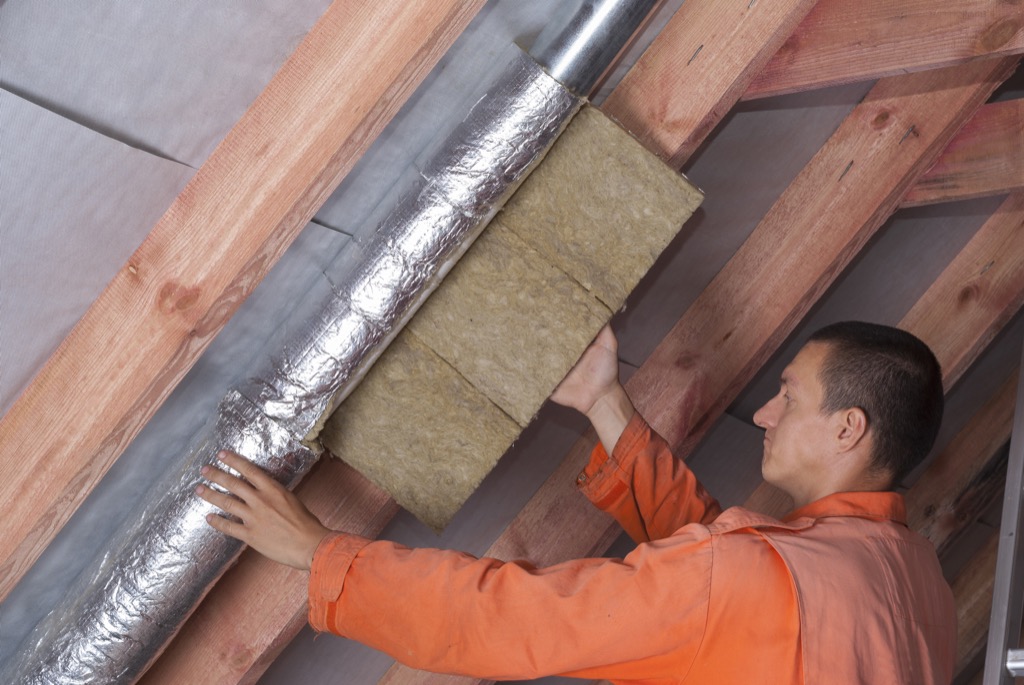
As much as 30 percent of the air moving through your duct system is lost to leaks. By insulating your heating ducts, you can save money on heating bills and conserve energy throughout your home.
30
Use a Programmable Thermostat

Being green sometimes means getting green, too. Installing a programmable thermostat to effectively monitor your heating and cooling systems can slash your heating bill by up to 15 percent a year. Looking for more ways to live your best life? Check out these 20 Healthy Living Rules You Should Live By.
To discover more amazing secrets about living your best life, click here to sign up for our FREE daily newsletter!